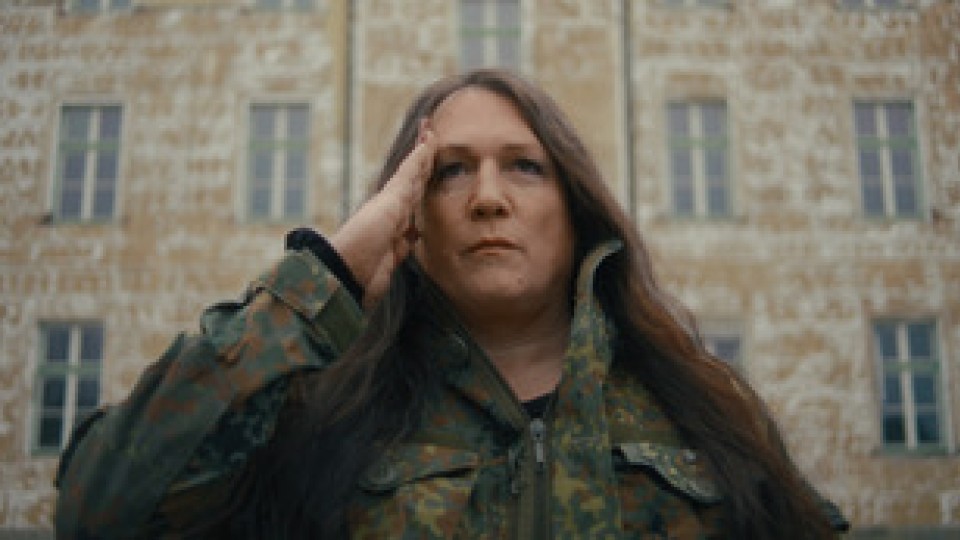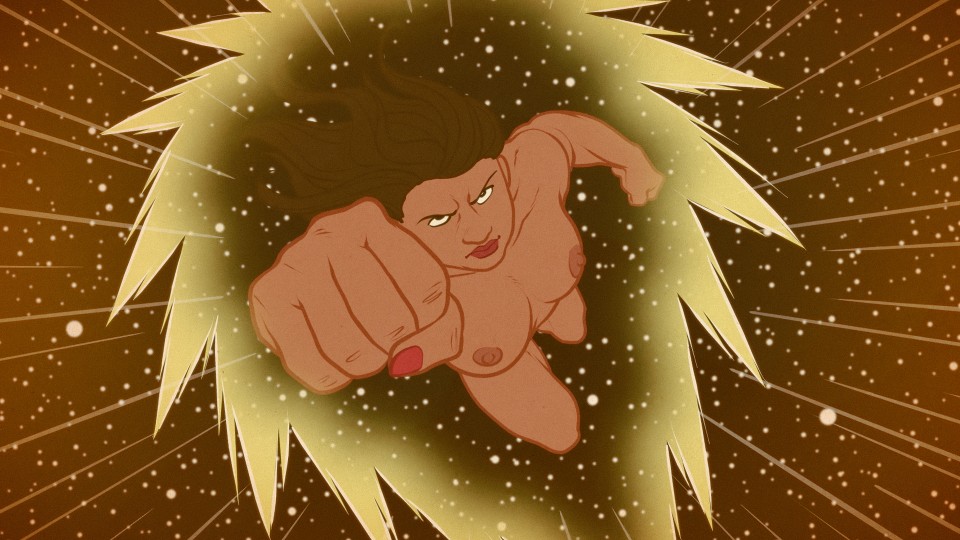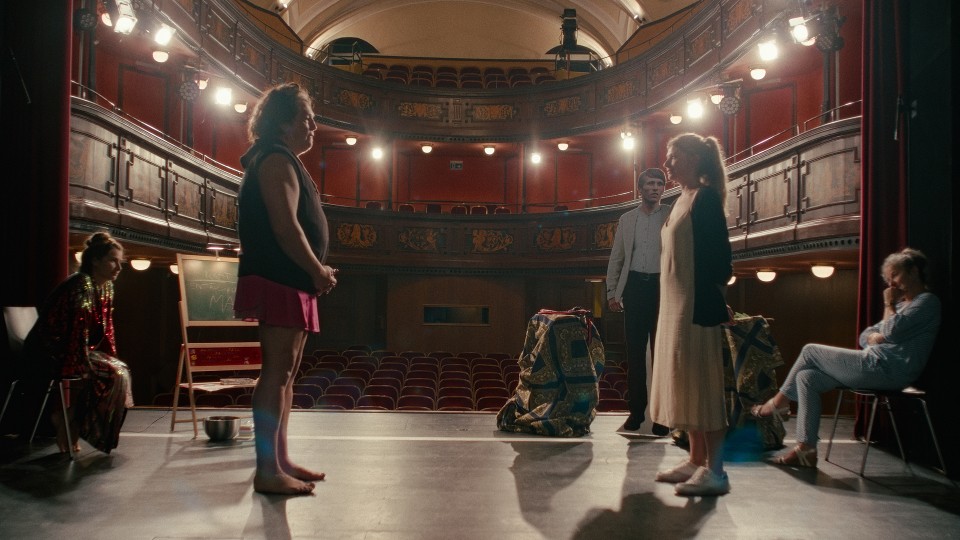The German title, DER SOLDAT MONIKA makes it clear immediately: someone here is both she and he. And that’s not all: in existential
and political issues too, Monika Donner appears to take opposing positions. The filmmaker Paul Poet has been working for four
years on a portrait of the former Defence Ministry official and military strategist, the anarchist and individualist, left-wing
queer and right-wing Covid activist Monika Donner. In an attempt to do justice to a personality full of facets and contradictions,
he has created a wild collage which also reflects a period of irrationality and declining rigor in the media and politics.
Was there a specific trigger that prompted you to create what you describe in the synopsis of SOLDIER MONIKA as a cinematic
psychogram of Monika Donner?
PAUL POET: I had originally planned to make a film about the political shift to the right, because my own roots are in the left-wing
autonomous scene and underground pop culture. From the noughties onwards, these positions were expropriated by the right-wing
scene; suddenly, those guys were presenting themselves as sexy and cool. These were the years when the Identitarian movement
was on the rise, and as an anti-fascist I found that very disturbing. How do you take back this aura of rebellious glamour
from the right-wing scene? In 2016, I was commissioned by a private TV station to make artistic mini-documentaries about the
conspiratorial scene around the world. For the episode about 9/11, Monika Donner was recommended to me as an expert. I didn’t
know much about her before the shoot – and suddenly this extremely tall, long-haired trans Valkyrie with high heels and very
long fingernails came up and demonstrated to me, using papier-mâché models of the Twin Towers and model planes, that events
could never have played out the way they are described in the official account. At that moment, my very personal John Waters
dream came true. She was such a fascinating, impossible person, just as the film is very intentionally the portrait of an
impossible person who can’t be classified according to usual criteria. Monika is a living monument, constantly challenging
you to abandon pre-conceptions – because you can’t conceive of someone like that at all. It was a permanent rollercoaster
ride for me, too; at exactly the same moment I felt the urge to kiss her and to hit her. You have to fall back on a fundamental
concept of democracy: that it’s necessary to go deeper and spend more time trying to understand people. We have lost that
basic respect because we’re so busy using clicks and likes to block lines of enquiry in a hurry.
Did she fascinate you as an individual, or as a phenomenon that reflects our time, where intellectual positions lose all rigour
and obscure combinations of concepts generate political tendencies?
PAUL POET: I tried to do justice to Monika as a person, and to her highly individual struggle for her right to live freely – a struggle
that caused her to give up any group or team affiliation. For a long time she voted for the Green Party and was active in
the queer scene, though she was also a right-wing hooligan in the past and has a military career behind her. She fought for
LGBTQ rights, but due to her right-wing activities, this was deleted from trans records: during the pandemic, she became an
Amazon bestseller, especially through books like Corona Dictatorship, and she was also a star in the right-wing extremist scene. Now the pandemic is over, this very scene is bringing her transsexuality
to the fore and turning away from her.
The film has documentary and fictional components, using archive material and animations as well as elements from theatre
work. Did this multi-layered personality actively demand the collage form? How did your film concept on SOLDIER MONIKA come
about?
PAUL POET: The film was intended as a living assemblage of these different narratives, which interact in confrontational style. As far
as Monika is concerned, she also felt the need for introspection: in many ways, she’s a mystery to herself, too. She would
like to see a more colourful and diverse world, and to spread that message. I felt we had common ground there. She came to
see that I was treating her as an equal and not trying to trick her with any cunning tactics. For me, that meant spending
four intense years in a foreign land – the right-wing scene – where I was very clearly perceived as a leftist. The creation
of this entertaining, disturbing and definitely extremely wild collage was very deliberate: a complex framework of interaction
between feature film, experimental and documentary approaches. Monika's confrontation with her old life as someone who is
now over 50, which is what she undergoes in key scenes and dreams, is the actual story of the film. It is presented as dramatic
family interaction, re-enacted incidents and documentary accompaniment. The actors bring a special quality to the table, because
they are all entering unknown territory in terms of their acting careers. It is also important to mention that I kept a dream
diary together with Monika during the four years of filming. We captured very precise daydream-like visions and incorporated
them into the film. Without Monika's openness, this film would not have been possible.
Experiencing alternating waves of encouragement and rejection is a constant factor in Monika's life story. Have you found
any explanation for this behaviour – enthusiasm followed by repudiation – in our current media culture?
PAUL POET: The process of making the film enabled us, almost by chance, to witness a strangely classic story of rise and fall: Monika's
expulsion from the Ministry of Defence, her Covid career – which saw her selling her book in startling high numbers – and
now her rejection by right-wing alternative media.
We live in a random readymade culture where everything is constantly available. Permanent presence is required in the arena
of opinion and assertion; what counts is impact and emotionality, not substance or real knowledge. Monika Donner is built
up as a star figure but just as quickly pulled back down as soon as she stops going along with the flow. This is currently
the case on both the left and the right. There were also shit-storms in the run-up to the film which were intended to cast
doubt on me as a left-wing filmmaker. But I approached the whole thing with a different kind of conviction. I have criticized
many things about my left-wing environment in recent years: if you are left-wing, you need a radically humanist basic attitude
in dealing with other people, and that includes what is seen as the enemy camp. Consequently, I was able to enter that scene
without any fear, focussing on appreciating the human elements, and without compromising my beliefs one iota. I embarked upon
a bizarre voyage of exploration. It is my conviction that this ubiquitous click and function culture, which no longer reflects
on wider contexts in any way, inevitably brings about a shift to the right, because these mechanisms are inherent components
of right-wing thinking.
The theme of provocation is constantly present, bringing with it the question of what limits there should be. I’m thinking
of Monika Donner reading a poem by Adolf Hitler at the beginning of the film, trying to play down the Nazi regime and trivializing
the neo-Nazi Gottfried Küssel. What is your position on this?
PAUL POET: It's very much a question of aesthetic courage. What do you dare to make public? If you have a protagonist like Monika Donner,
who exists in permanent ambivalence, you must rise to the challenge of revisiting these disturbing contradictions. I agreed
with Monika's decision to recite a poem by the young Adolf Hitler because it brings about a sensation of pain. But it also
raises questions. And I’m trying to employ this friction, this feeling of being offended, to make people think. I don't think
I’m really giving a platform to someone like the neo-Nazi Gottfried Küssel in my film, because rather than depicting him in
any positive way, I address his contradictions. The provocations constitute a kind of obstacle course, and that opens up a
space for independent thinking. Which is something we desperately need as a society. If we want to preserve democracy as our
forum for fundamental values in the political sense, we must also admit the essential complexity of human beings and accept
existence as an unguided process. The basic position of dialogue must be changed. Discourse and dialogue have been lost over
the last two decades, as populist self-optimization steadily overheats the atmosphere. That's why so much left-wing culture,
so much political culture no longer works.
There is a scene with the right-wing extremism expert Natascha Strobl, who regards Monika Donner as a right-wing libertarian.
What kind of political assessment of Monika Donner have you arrived at, after four years of working together her?
PAUL POET: As far as Monika is concerned, I'm definitely with Natascha Strobl. For a long time, it was unthinkable that Monika Donner
would appear together with people who were clearly key left-wing figures. I had to do a lot of convincing to get someone from
a left-wing background to appear on camera with Monika Donner. Natascha Strobl was a stroke of luck. She made it clear that
being involved in the project definitely made her feel uncomfortable, but she trusted me personally. The scene with them and
Nathalie Rettenbacher, the trans spokeswoman for the Left Party, is a key moment. It was also crucial for Monika to meet someone
from the left-wing scene, after the disappointment of being expelled from the queer scene. It was a fine shoot, and we managed
to pull something off which was essentially impossible. For me, the highlight of the film is seeing Monika, who has spent
50 years of her life resisting all classification, in the same boat as Natascha Strobl, who successfully gives her a label
for the first time: "You’re a right-wing libertarian." And Monika answers: "That's a complete contradiction: it suits me."
It is precisely at this moment that she finds peace with herself.
Interview: Karin Schiefer
November 2024
Translation: Charles Osborne






